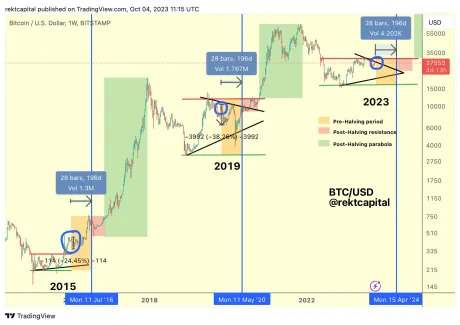This week, Bitcoin has experienced a bit of a downturn, with its value dropping around 3% since the week's start.
It's been struggling to break past the $27,000 mark, which might signal the possibility of further declines in the near future.
A crypto expert, Rekt Capital, suggests that this recent dip could be part of a familiar pattern in Bitcoin's history linked to its "halving" events.
Bitcoin's halving occurs approximately every four years and cuts the rewards for miners in half. This is done to slow the creation of new Bitcoins and manage inflation.
Based on data from the last two halvings, there's a chance that the price of Bitcoin could drop by as much as 38% before the next halving.
Rekt Capital has shared a chart showing significant price corrections happening roughly six months prior to each halving event.
For instance, in 2015, Bitcoin went down by 25% 196 days before the 2016 halving. In 2019, it dropped by 38% 196 days before the 2020 halving.

Since the next halving is expected in April 2024, it seems that the market might be primed for another correction.
Currently, Bitcoin is trading at a value 60% lower than its all-time high, a trend similar to previous halving cycles.
For instance, 200 days before the 2020 halving, Bitcoin was 60% below its peak price. Similarly, 200 days before the 2016 halving, it was 65% below its highest value.
What might this correction mean for Bitcoin?
The future direction of Bitcoin's price is uncertain, especially as on-chain transactions are at a three-month low.
On-chain metrics also indicate that 95% of Bitcoin's available supply hasn't changed hands in the last month, suggesting that investors are holding onto the cryptocurrency in anticipation of the SEC's approval of spot Bitcoin ETFs.
While it's important to remember that past performance doesn't always predict the future, if this pattern repeats itself before the next halving, Bitcoin could indeed see a significant drop.
With Bitcoin currently priced at $26,770, a 38% retracement could push its value below $18,000, which could be tough for Bitcoin holders.
Despite the possibility of a correction, Bitcoin's long-term growth prospects remain robust.
Over the past decade, it has consistently shown an upward trajectory, becoming the largest cryptocurrency by market capitalization, even in the face of various challenges.
In fact, this year, Bitcoin has been hailed as the best performer in terms of asset investing, according to Reflexivity, a digital asset research firm.
Billionaire hedge fund manager Paul Tudor Jones even suggests that now might be the best time to invest in Bitcoin.


























